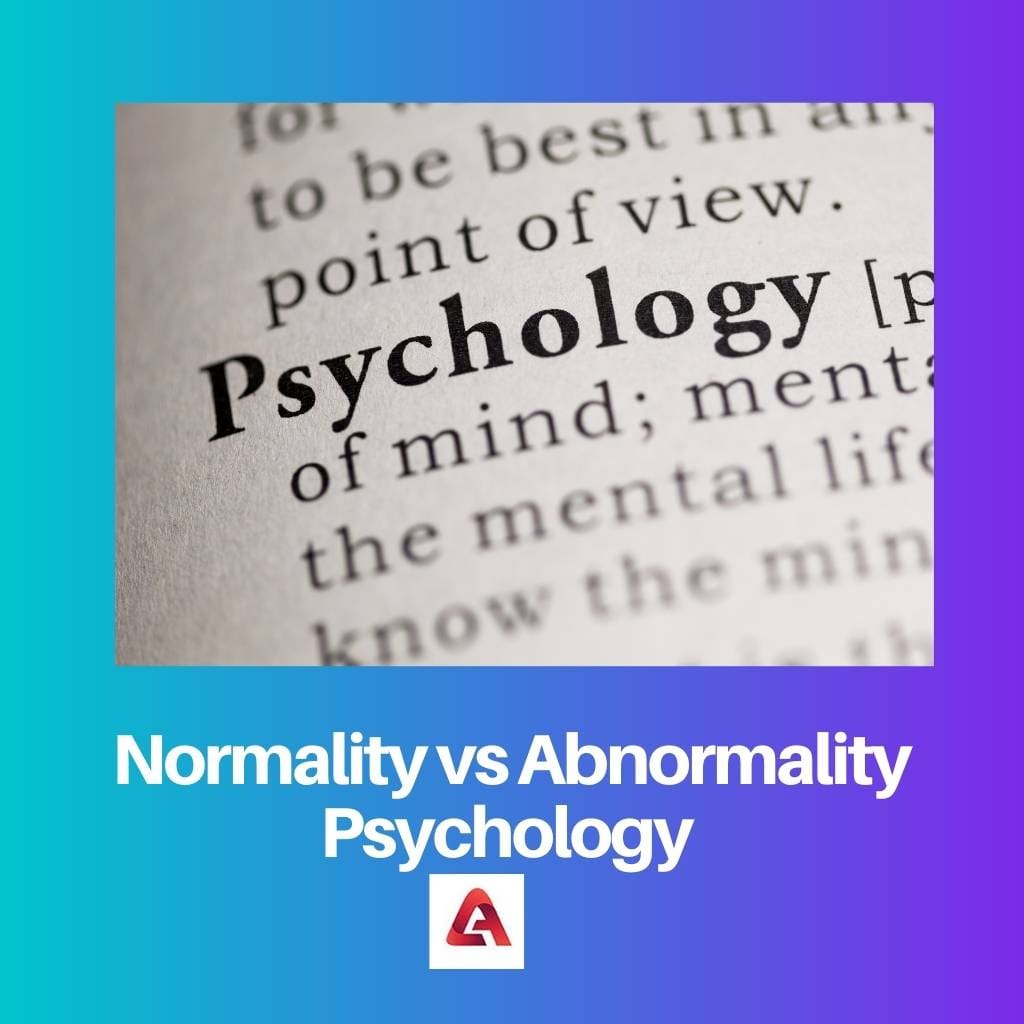In today’s world, mental peace and stability have become very important aspects of an individual’s life. Mental health is not something that we either have or do not have.
The emergence of psychology as a subject has taken a good peek at us.
Normality and Abnormality Psychology are two psychological terms. In simple words, normality is something that is good, and abnormality is something that is bad. These two words are antonyms and are distinguished.
Normality and Abnormality Psychology is used to describe someone’s behaviour, nature, thoughts, feelings, emotions, etc.
Key Takeaways
- Normality refers to behaviors, thoughts, and emotions that conform to societal norms and expectations, while abnormality deviates from these standards.
- Abnormality associates with psychological disorders, while normality does not indicate mental health issues.
- The distinction between normality and abnormality is sometimes clear-cut, as cultural, historical, and situational factors influence perceptions of what is normal or abnormal.
Normality vs Abnormality Psychology
Normality is defined as behaviour that conforms to the expectations and norms of a particular culture or society. It is the typical, expected, or usual way of thinking, feeling, and behaving. Abnormality means behaviours, thoughts, or feelings that deviate from the norms or expectations of a particular culture or society. It might include excessive anxiety, depression, or substance abuse.

In terms of psychological facts, the term normality psychology refers to an individual’s behaviour, way of behaving, emotions, thoughts, idea, etc, which are not found different from other people or, in simple words, is normal.
Normality is a behaviour where people act normally and appropriately in any kind of situation or task. An individual who can adjust themselves in any kind of situation.
On the other hand, the term abnormality psychology refers to an individual’s behaviour, way of behaving, way of expressing emotions, thoughts, etc, which are not normal or usual and disturbing or, in simple words, different from others.
Abnormality is a behaviour where people can not adjust themselves and feel irritated and discomfort.
Comparison Table
| Parameters of Comparison | Normality Psychology | Abnormality Psychology |
|---|---|---|
| Definition | Normality psychology refers to an individual’s behaviour, emotions, thoughts, etc as usual or normal | Abnormality psychology refers to an individual’s behaviour, emotions, thoughts, etc as unusual or abnormal |
| Symptom | Normal behaviour, ability to cope up with the environment, usual thinking capability, etc | Feeling low or sad, anxiety, excessive mood swings, confusion, laziness, tiredness, sleeping problems, etc |
| Mental Health | A healthy and good peace of mind for a longer period of time | Fluctuation of emotion or feeling leads to irritation or breakdown that does not last for a longer period of time |
| Medication | Medication is not required | Medication is required |
| Effects on others | A positive response from others is being noticed | A negative response or behaviour from others is being noticed |
| Example | A person normally walking on a road. | A person barking at a street dog while walking. |
What is Normality Psychology?
Normality psychology refers to an individual’s usual or normal behaviour on a daily basis. A person is termed as normal when he or she can cope with his environment without any discomfort.
A normal person can adjust themselves to any sort of situation and its surrounding factors.
The mental health of a normal person is calm and uses their time without stress, can work productively and can make a contribution towards their society.
A person can be determined as normal on the basis of their usual, everyday lifestyle. An individual’s behaviour towards social norms and expectations decides the normality.
Even the surrounding people have a positive approach towards a normal person.
Generally, psychologists agree with normality on the basis of the patterns of behaviour or personality traits that are typical. Sometimes it is easy to distinguish between individuals whether they are normal or abnormal.
But, at times, it is hard to determine.

What is Abnormality Psychology?
Abnormality psychology refers to an individual’s unusual or different behaviour or emotions. Mental instability, irritating or discomfort behaviour, etc. A person will instability finds it difficult to cope with their surroundings or people.
It takes a great change in normal functioning. It totally depends upon the symptoms and behaviour. The symptoms of the same problem might differ from individual to individual. The definitions might change over time.
Symptoms such as feeling low or lonely, insomnia, mood swings, etc., determine the behaviour of abnormality. Proper medication and other external help or guidance are very important.
People with such kind of abnormality not only faces a problem with themselves but also with their surrounding. People don’t have any kind of positive behaviour towards this.
Instead, they see an individual with an eye for inferiority, irritation, danger, etc.

Main Differences Between Normality and Abnormality Psychology
- Normality psychology refers to an individual’s behaviour, thoughts, emotion, etc., which is usual or normal. In contrast, abnormality psychology refers to an individual’s behaviour, thoughts, emotion, etc., which is unusual or abnormal.
- Normality psychology symptoms include normal behaviour, ability to cope with the environment, usual or normal thinking capability, etc. Whereas abnormality psychology symptoms include feeling sad or low, anxiety, excessive mood swings, confusion, laziness, tiredness, etc.
- A person with normality psychology has a healthy and good peace of mind that lasts for a longer period of time. Whereas a person with abnormal psychology has a fluctuation of emotions or feelings that leads to irritation and breakdown, and it does not last for a longer period of time.
- Medication is not required in normality psychology, Whereas medication is required in abnormality psychology.
- A person with normality psychology gets a positive response from others. Whereas a person with abnormal psychology gets a negative response or behaviour from others.
- https://psycnet.apa.org/record/2002-18351-013
- https://www.cambridge.org/core/journals/developmental-medicine-and-child-neurology/article/normality-and-abnormality/ABB1EEC0805F5B56687EB44647F5CB55

A nuanced understanding of normality and abnormality in psychology is essential, given the intricate interplay of psychological, social, and cultural factors in shaping human behavior and experiences.
I agree, Alan. Psychology demands a comprehensive perspective that integrates various dimensions of human experiences.
Well expressed, Alan. It’s vital to consider the complexities of these factors when approaching mental health care.
Cultural, social, and individual differences necessitate a comprehensive understanding of normality and abnormality in psychology.
Well articulated, Wood. It’s essential to recognize the intricate layers that contribute to our understanding of these psychological concepts.
The manifestation of normality and abnormality varies widely across different cultures and societies, which makes it imperative to approach these concepts with sensitivity and understanding.
Absolutely, John. Acknowledging this diversity is crucial in fostering a respectful and equitable approach to mental health.
The fluid nature of normality and abnormality underscores the importance of empathetic and comprehensive mental health care that accommodates diverse experiences.
Well stated, Pete. We must strive for inclusive mental health care that respects individual narratives.
Absolutely, Pete. Mental health support should be grounded in empathy and encompass the diverse realities of individuals.
The culture and society where the individual lives play a fundamental role in determining what is considered normal or abnormal.
Absolutely, Sophie. Our perceptions of normality and abnormality are shaped by our surroundings.
Well said. It’s essential to take cultural and social factors into account when dealing with these concepts in psychology.
The perception of normality and abnormality is not fixed, but rather evolves with our understanding of mental health and the changing dynamics of society.
We need to be careful when using the terms normality and abnormality in psychology, as they can be subjective and depend on cultural, situational and historical contexts.
That’s correct. Mental health is a complex field and it’s important to consider all these factors when evaluating someone’s behavior.
I totally agree. There’s a lot of nuance in psychology and we need to be mindful of the context when making these distinctions.
Normality and abnormality are not always clear-cut and can be influenced by many variables such as time, place, and situation.
I completely agree. We must take a holistic view when assessing normality and abnormality in psychology.
Indeed. It’s an intricate puzzle that requires a multifaceted approach to understand an individual’s mental state.
Psychology challenges us to critically examine the frameworks through which we view normality and abnormality, compelling us to adopt a more inclusive and nuanced perspective.
I couldn’t agree more, Mason. Psychology prompts us to broaden our horizons and refine our approach to mental health.
Mental health doesn’t adhere to a binary classification of normal or abnormal and it’s crucial to consider the unique aspects of each person’s experience.
True, Maisie. Every individual’s mental health journey is unique and shouldn’t be confined to labels.